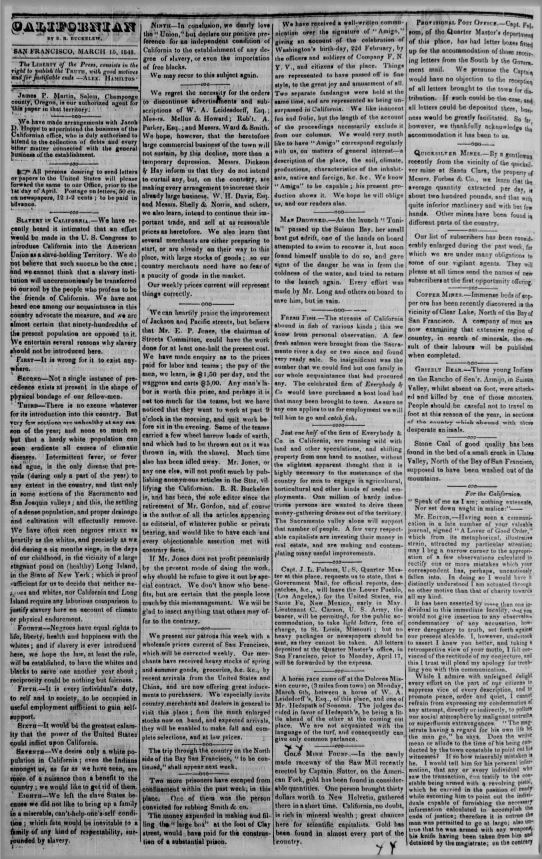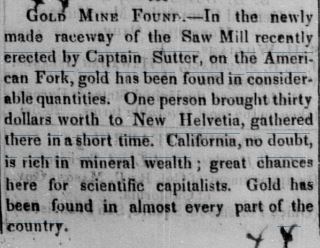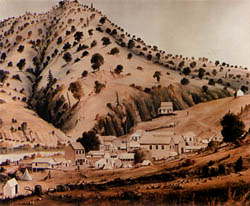
The discovery of gold at Sutter’s Mill in California was first reported on March 15, 1848, in the Californian, a San Francisco newspaper. The article was buried on page 2 of the four page edition, and consisted of a single paragraph:
Gold Mine Found
In the newly made raceway of the Saw Mill recently erected by Captain Sutter, on the American fork, gold has been found in considerable quantities. One person brought thirty dollars worth to New Helvetia, gathered there in a short time. California, no doubt, is rich in mineral wealth, great chances here for scientific capitalists. Gold has been found in almost every part of the country.

It should be noted that this blurb was printed in the same column as another blurb on the need to bring fresh fish from the American River to the citizens of San Francisco, and yet another blurb on the importance of people settling in the area to farm, rather than speculating in land.
It appears that the newspaper editor was more interested in development of the area around San Francisco than in starting a gold rush. He wanted more settlement, not more speculation. Yet speculation is what the nation got after the news spread.
A few days later, the rival San Francisco paper, the California Star, reported on March 25, 1848:
So great is the quantity of gold taken from the mine recently found at New Helvetia, that is has become an article of traffic in that vicinity.
In a six-page issue, the discovery of gold merited a single sentence on page 4, with no headline.
Despite the prosaic attitude of the newspaper editors in March 1848 toward the gold find, men in San Francisco were eager for riches. They headed for the gold fields.
Meanwhile, in the area around Sutter’s Mill, miners were finding more and more gold daily. Sutter continued to lose workers to the gold fields.
Sutter told John Bidwell, his business manager, about the discovery of gold, and sent Bidwell to San Francisco with the gold samples to have them assayed. (It’s possible Bidwell’s trip to San Francisco alerted the newspapers to the discovery.)

Based on the assay results, Bidwell decided there was probably gold buried all through the Sierra foothills. He soon found gold on the Feather River, about 80 miles north of Sutter’s Mill, near what is present-day Oroville, California. (Oroville is named for the Spanish word for gold—“oro”.)
The area where Bidwell found his gold came to be called “Bidwell’s Bar.” Bidwell’s Bar became one of the richest lodes in California. Now, however, the location is buried under Lake Oroville, due to damming of the Feather River.
In 1849, Bidwell opened a store for the miners flocking to the area, and made over $100,000 through mining and the store—a huge fortune in those years. Bidwell also bought the Rancho Arroyo Chico, and founded Chico, California. Then, as now, more fortunes were made in everyday commerce than through spectacular finds.
Would you rather have been a miner or a storekeeper during the Gold Rush? Or a newspaper editor?




Interesting post, Theresa. I think I would have done better as a storekeeper. Competing with other miners during the rush sounds as though it might be as chaotic as the shoe department during a 75% off sale.
“as chaotic as the shoe department during a 75% off sale.” — But with guns!
Thanks for commenting,
Theresa
Well, these days, you never know who has a gun in their designer handbag. 🙂
That’s a really interesting question…since you’re writing the story, I’d like knowing which perspective you’d see it from. Me, I’d probably be a dance hall girl.
Janet, thanks for a laugh.
I’ve been researching the dance hall girls. Some had very sad lives or came to bad ends, but some did quite well.
I’d probably have been the newspaper editor, all the while wishing I had the riches of the storekeeper.
Theresa
Coming back here again as I got distracted and never answered the question. I would have been a storekeeper. I’ve been one, and my father was one and my grandfather and his parents and relatives before them in the Netherlands. So, yes, definitely a storekeeper.
Sounds like you would have been a storekeeper!
Thanks for reading,
Theresa
[…] given in Seattle at the time was to “mine the miners, not the mines.” Just as I learned in my research about the rise of businesses feeding off the California miners. Unlike many museums, MOHAI focuses on commercial development—the industries and businesses that […]
[…] the word of the gold find. Brannan owned The California Star newspaper, and he minimized the news when it was first reported in March 1848. He wanted to plan how he would capitalize on the coming gold fever—not as a prospector himself, […]